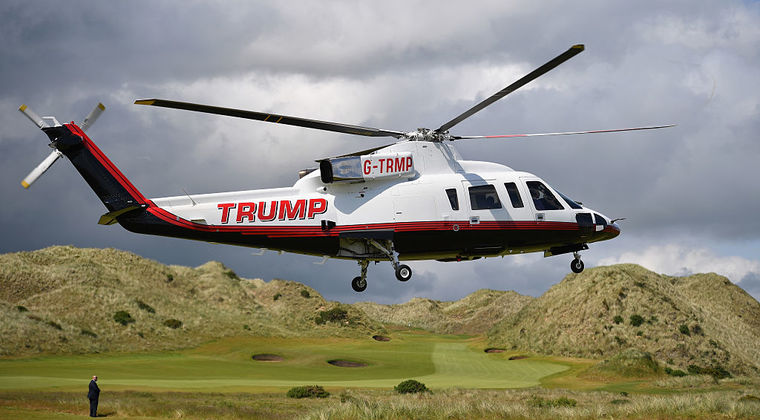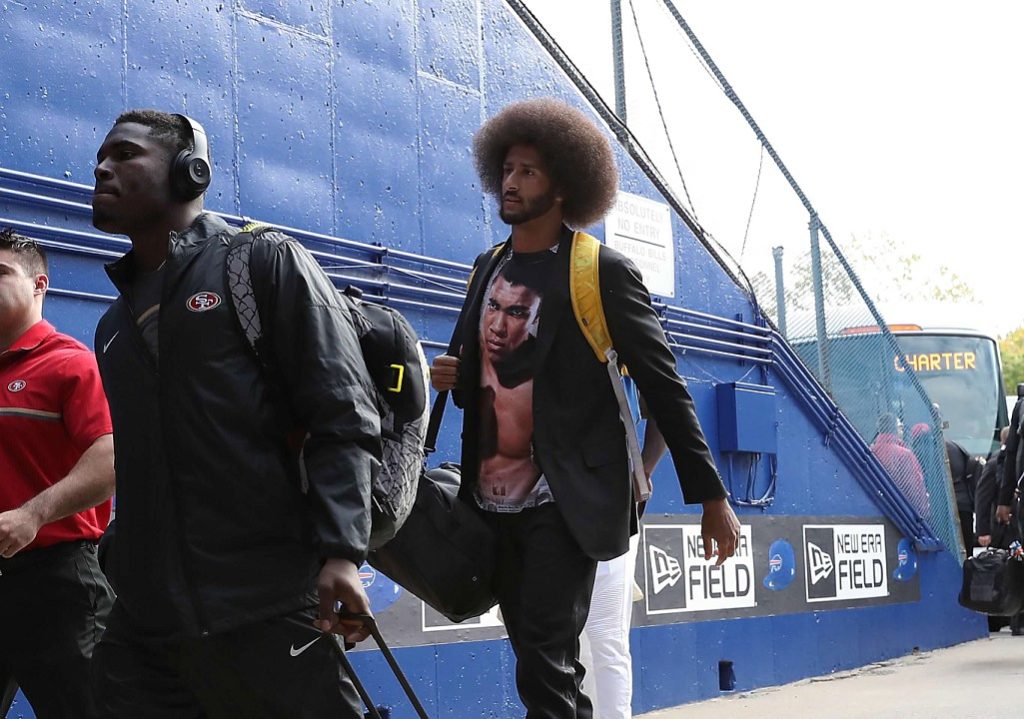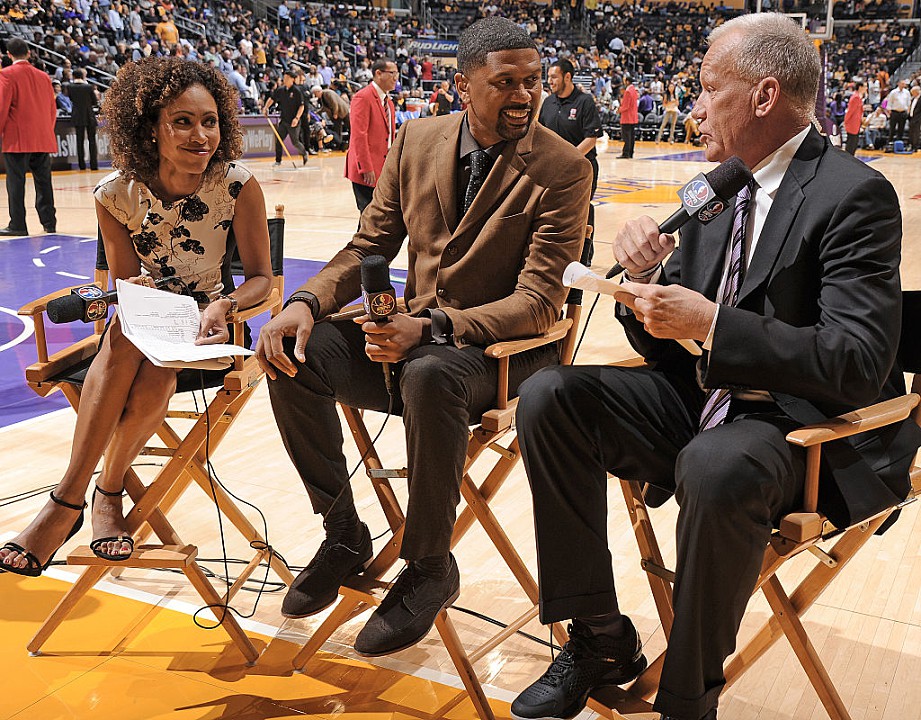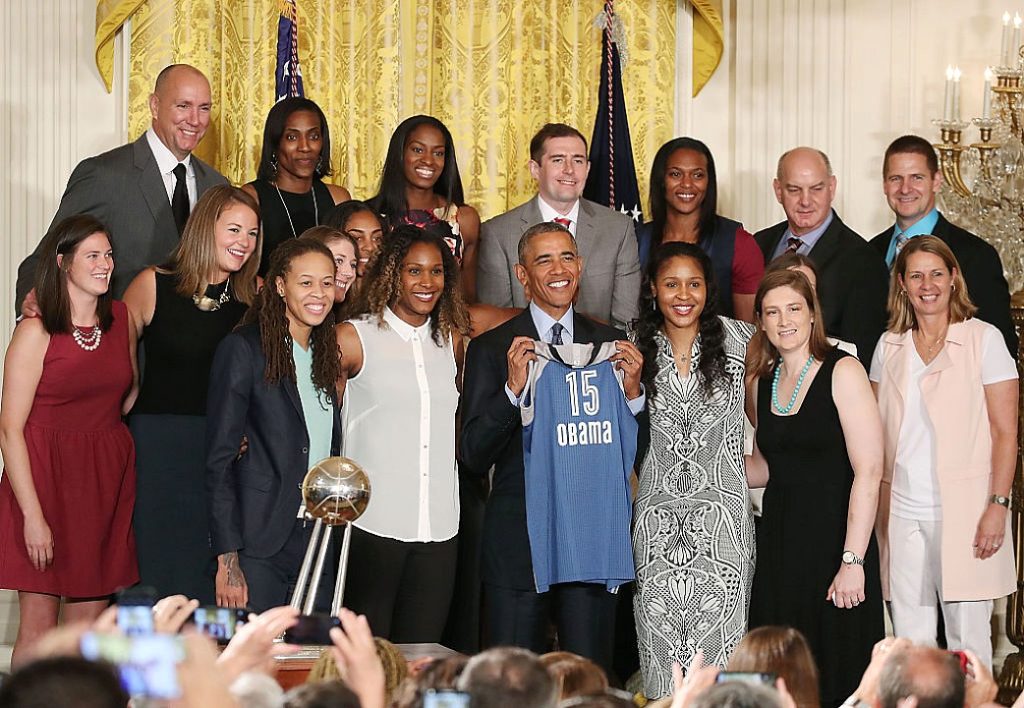
By Bijan C. Bayne
©2016, The Shadow League

U.S. presidents have historically taken a healthy interest in sports and recreation. Through time, their play, their fandom, or their encouragement have shaped their constituents outlook on the role of sport in society.
The example of Teddy Roosevelt inspired citizens to stay physically fit, and to explore the nation’s new national parks. Franklin Roosevelt felt it important that major league baseball continue as a source of entertainment during World War II. He also used Joe Louis’ muscles as a metaphor for defeating Germany.
Harry Truman’s integration of the armed forces was the impetus for baseball commissioner Happy Chandler to approve of the Brooklyn Dodgers signing of Army veteran Jackie Robinson to break the game’s color barrier.
President Eisenhower was an avid golfer, which helped grow interest in the game. His successor, John F. Kennedy, was often photographed either sailing or playing touch football with his large family.
Politically, JFK established the President’s Council of Physical Fitness, which instituted exercise programs in the public schools. Lyndon Johnson approved the merger of the American and National Football Leagues. And President Bush is remembered for throwing out the first pitch at an emotional World Series game after the attacks of September 11, 2001.
President Obama enjoys participating in basketball and golf, and famously fills out an NCAA Men’s Basketball championship bracket on national TV.
On November 8th, Donald Trump was elected President of the United States. Trump, who played baseball and basketball in military school, owned the New Jersey Generals of the USFL, and whose properties have hosted professional golf tournaments, has had as direct a relationship to sport as perhaps any president since former Michigan All-American football center Gerald Ford.
As he plans his transition and administration, like every sector of society, the athletic world considers how a Trump administration could alter its landscape. On issues such as immigrant players, visiting national teams, team and individual protests, White House team visits, and sexual assault and rape, how will the policies, cabinet, coverage, and reaction to the new president color one of the world’s favorite diversions?
Where will politics and sport blur, or collide? It didn’t take long after Election Day for clues to emerge.
Trump had not occupied his position for 24 hours before Pistons Coach Stan Van Gundy was the first nationally prominent figure to speak out against the president-elect. “I don’t think anybody can deny this guy is openly and brazenly racist and misogynistic,” Van Gundy said. “We have just thrown a good part of our population under the bus, and I have problems with thinking this is where we are as a country.”
Warriors Coach Steve Kerr said, “This is the presidential election. Not the ‘Jerry Springer Show'”
Before Trump was voted in, Dodger pitcher Adrian Gonzalez refused to stay with his teammates at a Trump Hotel in Chicago.
Patriots Coach Bill Belichick and his quarterback Tom Brady were pressed for answers concerning Trump having cited both of their support at a New Hampshire rally on the eve of the election, including a letter from Belichick. While Belichick confirmed having sent the letter, he pivoted to a rather apolitical stance. Similarly, Brady said his wife Gisele Bündchen has insisted he not make further comments on politics.
We are in uncharted territory. Unlike when FDR or JFK were in office, or during Johnson and Richard Nixon’s travails with U.S. military intervention in Southeast Asia, athletes have their own media platforms, publications, online followers, foundations and even sports agencies. They express their support or disdain for public policy in real time.
Today’s athletes, from Mizzou to Miami, reach fans with instant input on the public state of affairs. Colin Kaepernick became a household name outside of the NFL for his beliefs three months before the election.
What will President-Elect, and President Trump say when asked about such demonstrations? During the campaign, he and Vice President-Elect Pence sided with law enforcement when confronted about police violence against unarmed Blacks, and during a debate Pence said implicit racial bias is exaggerated.

Sport is a microcosm of society, and a clubhouse is a workplace, if a very insular and privileged one. News of divided locker rooms is already public. Mike Freeman of Bleacher Report wrote that when asked their feelings about the presidential election, a white offensive lineman from the AFC called it “One of the greatest days of my life.”
A Black offensive lineman from the same conference said it was “Easily one of the worst days of my life. It’s like my dog died.
In the NBA, Golden State Warriors forward David West said to CSN Bay Area:
“I don’t think there’s any room to not face the obvious truth: that he speaks for the majority of the people in this nation. His attitudes about black people and Muslim people, about women, about just about whatever group you can name, folks agreed with his position. And you can’t deny that because folks voted for him.
“So this whole fairy tale about some post-racial . . . this utopia that Obama supposedly created, it’s all bull. That’s the bottom line. When you look at what the results say from last night, this nation has not moved a thread in terms of its ideals.”
Knicks forward Carmelo Anthony told Newsday:
“I talked to kids today this morning, my family, you can just hear the nervousness,”
Danny Torres is a high school teacher and New York-based freelance sports writer. His work has appeared on MLB.com, the Amsterdam News, LatinoSports.com among others.
Torres told The Shadow League, “The coined expression, ‘The Trump Effect’ has already proliferated throughout our society. Personally, I can only talk about the sport I grew up watching and now writing about – baseball. In the wee hours when Trump’s victory became official, I immediately wondered, ‘WWJD’? But the person I did think about wasn’t the divine founder of Christianity but of the extraordinary man who broke the color barrier in 1947. As a Republican, Jackie Robinson was one of the few prominent African-Americans who supported President Richard Nixon and New York Governor Nelson Rockefeller. And yet, he detested and stood up for every injustice within the party. In 1964, he wrote directly to the Republican governor and made his voice known to say, ‘If you don’t want to hear the down-to earth truth about how you are thought of in the Black (and today, we can say, Latino, Asian Muslim, European, LGBT, immigrant) communities, let’s just forget about it. As an American of Puerto Rican ancestry with no party affiliation, I say to those athletes – Be a true champion, sit down in the Oval Office and speak directly to President- Elect Trump.”
Will college and professional players boycott the administration by not visiting White House with their championship teams?
Sport is a microcosm of society, and a clubhouse is a workplace, if a very insular and privileged one. News of divided locker rooms is already public. Mike Freeman of Bleacher Report wrote that when asked their feelings about the presidential election, a white offensive lineman from the AFC called it “One of the greatest days of my life.”
A Black offensive lineman from the same conference said it was “Easily one of the worst days of my life. It’s like my dog died.
In the NBA, Golden State Warriors forward David West said to CSN Bay Area:
“I don’t think there’s any room to not face the obvious truth: that he speaks for the majority of the people in this nation. His attitudes about black people and Muslim people, about women, about just about whatever group you can name, folks agreed with his position. And you can’t deny that because folks voted for him.
“So this whole fairy tale about some post-racial . . . this utopia that Obama supposedly created, it’s all bull. That’s the bottom line. When you look at what the results say from last night, this nation has not moved a thread in terms of its ideals.”
Knicks forward Carmelo Anthony told Newsday:
“I talked to kids today this morning, my family, you can just hear the nervousness,”
Danny Torres is a high school teacher and New York-based freelance sports writer. His work has appeared on MLB.com, the Amsterdam News, LatinoSports.com among others.
Torres told The Shadow League, “The coined expression, ‘The Trump Effect’ has already proliferated throughout our society. Personally, I can only talk about the sport I grew up watching and now writing about – baseball. In the wee hours when Trump’s victory became official, I immediately wondered, ‘WWJD’? But the person I did think about wasn’t the divine founder of Christianity but of the extraordinary man who broke the color barrier in 1947. As a Republican, Jackie Robinson was one of the few prominent African-Americans who supported President Richard Nixon and New York Governor Nelson Rockefeller. And yet, he detested and stood up for every injustice within the party. In 1964, he wrote directly to the Republican governor and made his voice known to say, ‘If you don’t want to hear the down-to earth truth about how you are thought of in the Black (and today, we can say, Latino, Asian Muslim, European, LGBT, immigrant) communities, let’s just forget about it. As an American of Puerto Rican ancestry with no party affiliation, I say to those athletes – Be a true champion, sit down in the Oval Office and speak directly to President- Elect Trump.”
Will college and professional players boycott the administration by not visiting White House with their championship teams?

“Personal politics in general can by a divisive topic. And for Donald Trump, during his candidacy, he became a polarizing candidate, which included along the way, insulting a lot of people,” said ESPN NBA analyst Jalen Rose. “So those same people today as American citizens have to digest that he’s going to be the next president of the United States. How it’s going to affect sports? Unlike Tom Brady, when his team won the championship, and he chose not to go to the White House, saying it was a scheduling conflict when Barack Obama was in office. What we’re going to see in professional sports — NBA and NFL — mark my words, there will be players that decline the opportunity to visit the White House under his presidency.”
And Richard Dietsch, Sports Illustrated writer/reporter, tweeted:
Only a guess: Teams will go but some individual players will opt out, with some players making public as to why.
Given allegations of Trump’s sexual assault, how will be national conversation around sexual assault or rape by athletes proceed? The Obama administration made prevention of campus sexual assault a primary issue of its Education Department.
Trump is a protectionist who opposes free trade with nations such as Mexico and China, where many products purchased by U.S. customers are made. Athletic shoe and sportwear manufacturer New Balance expressed its support of Trump the day after the election. Their vice-president of public affairs told Wall Street Journal reporter Sara Germano that President Obama “turned a deaf ear” to them, and things will “move in the right direction” during the new administration.
New Balance has made strong public statements and lobbied on Capitol Hill for domestic manufacturing, as it holds lucrative contracts to produce footwear for the military, defense contractors and support personnel. They believe the Obama administration has not been vocal enough regarding stateside manufacturing, or the importance of military gear being made in the USA.
Sneaker magazine Sole Collector cited New Balance’s pro-Trump stance on social media, and its followers began posting videos and photos of themselves burning or discarding their New Balance sneakers, accompanied by political commentary.
What impact will public need to escape from polarization or major news in headlines or the streets, to sport as diversion, have on ratings and attendance for pro and college sports? During a Trump presidency, will we pay more, or less attention to sport? More, as an escape, or less, as serious issues take precedence?
Sean Newell wrote for Vice Sports: “I will still watch the Jets, and I will still curse them when they find a spectacularly inept way to lose to the spectacularly mediocre Jeff Fisher, but it also seems weird that I will do that. The uncertainty of what this election means for the country and the people in it, is not something I can recall in my lifetime. (Maybe 9/11, which is an insane thing to say about an election, but here we are.) It seems weird to work at a sports web site right now.”
Already in professional golf, in June 2016, the PGA moved a tour event from Trump National Doral near Miami, to Mexico City. PGA Tour commissioner Tim Finchem said the move is financial, not political.
In response, Trump told FOX News’ Sean Hannity: “They’re moving it to Mexico City — which, by the way, I hope they have kidnapping insurance. But they’re moving it to Mexico City. And I’m saying, you know, what’s going on here? It’s so sad when you look at what’s going on with our country.”
In December 2015, Damac Properties removed a billboard featuring Trump’s name from a Dubai golf course and housing development after his controversial remarks calling for a ban on all Muslims traveling to the U.S. Trump was licensing his name and image there for a residential development and two golf courses in a deal reportedly worth $6 billion. The billboard depicted Trump in mid-golf swing, with his daughter Ivanka.
Trump’s second and third wives were immigrants to the U.S. In terms of immigration, there are thousands of international high school basketball players, soccer players, gymnasts, minor league baseball prospects, tennis players and college athletes in the U.S. Their visas and individual immigration status, and that of their families and coaches vary widely.
Trump says his first order of business is to reverse executive orders signed by President Obama which he deems unconstitutional. LGBTQ athletes could be affected by legislation months into the new presidency. Trump has said he will appoint Supreme Court justices who oppose marriage equality, and couples are rushing to wed before Inauguration Day. He could also reverse President Obama’s executive orders that protect their rights at work, and his Justice Department could scrap existing legal protections. Trump could sign orders, or reverse existing ones, which support LGBTQ tenants, contractors, patients, and even Don’t Ask Don’t Tell military rights. All that would touch U.S. athletes.
Vice President-Elect Mike Pence, while governor of Indiana, believed in “conversion therapy” for LGBTQ youth. He signed a state “Religious Freedom” law which allows discrimination against gays and lesbian people. NASCAR opposed the law, and NASCAR is affiliated with the annual Indianapolis 500 formula race. Charles Barkley, former Indiana Pacer star Reggie Miller, and scores of other athletes and former athletes not only spoke out against the law, but asked the NCAA (which also opposes the law) to move the 2015 Men’s Basketball Final Four from Indianapolis.
Leading the Trump transition team on domestic policy, is former Ohio Secretary of State Ken Blackwell, a senior fellow of the Family Research Council, which the Southern Poverty Law Center classifies as an anti-LGBTQ hate group. Like Pence, Blackwell also believes sexual identity is a choice, and that gays and lesbians may be “converted” via counseling.
Title IX of the Education Amendments of 1972 bans discrimination on the basis of sex. The current Justice Department and Department of Education, and some federal courts feel this protection extends to gender preference. The new administration could rule that it does not.
Yet verbally, Trump has stated a desire to be inclusive regarding gender identity. If that is the case, naming Pence and Blackwell sends negative messages to LGBTQ athletes, coaches, executives, sports media, trainers and fans.

Sports leagues, teams, tours and tournaments are businesses, even at the collegiate level. Because fans are the consumers, these enterprises claim diversity and inclusion as hallmarks. And international touring teams or non-U.S. athletes are not subject to the political whims of U.S. spectators. If they feel offended or unwelcome, they could limit their participation here.
As team Trump transitions, all these concerns seem organic, as no one has yet assumed office. Sport is a prism for the multiple shades of the national mood. The tone of an administration may send stronger messages than the stroke of a legislative pen. Yet in short order, long before the new president has taken his oath of office, we have already learned that change at the top means change afield.
This story originally appeared on TheShadowLeague.com, a site dedicated to journalistically sound sports coverage with a cultural perspective that insightfully informs sports fans worldwide.




